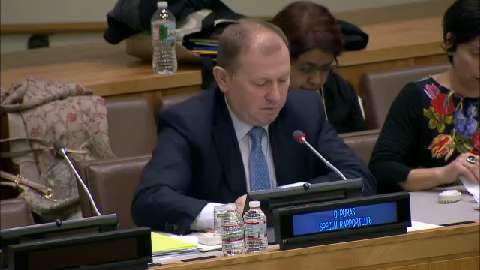This week, Dainius Pūras, a professor of psychiatry from Lithuania who has been appointed by the United Nations as an independent expert and Special Rapporteur on the right to health, presented a report to the Human Rights Council in Geneva. The report, which can be read in full here, calls for a radical and global “shift in approach” to the treatment of mental health issues.
“The urgent need for a shift in approach should prioritize policy innovation at the population level,” he writes, “targeting social determinants and abandon the predominant medical model that seeks to cure individuals by targeting ‘disorders.’”

The report by Pūras aims to inform global policy makers and healthcare workers of the current challenges facing mental health care and lay out priorities and opportunities for improving existing systems. The report identifies three major obstacles to mental health reform, including the dominance of the biomedical model, power asymmetries, and the biased use of evidence in mental health research.
While he acknowledges that many other organizations have called for improvements to existing services, he expresses concerns that these calls, based on “alarming statistics to indicate the scale and economic burden of ‘mental disorders,’” are too rooted in the biomedical model to “address the grossly unmet need for rights-based mental health services for all.”
“The focus on treating individual conditions inevitably leads to policy arrangements, systems and services that create narrow, ineffective and potentially harmful outcomes,” he writes. “It paves the way for further medicalization of global mental health, distracting policymakers from addressing the main risk and protective factors affecting mental health for everyone.”
Pūras also lays out an alternative framework for mental health care that is founded on a human rights paradigm. Informed consent makes up a key part of the rights-based approach to mental health care and Pūras argues that forced treatment is ineffective and “perpetuates power imbalances in care relationships, causes mistrust, exacerbates stigma and discrimination and has made many turn away, fearful of seeking help within mainstream mental health services.”
In addition, this paradigm shift means that “rights-based strategies” must also target the social determinants of mental health and seek to improve the environments and communities in which people live. Pūras writes:
“The fact that children spend a significant amount of time in schools and most adults at the workplace, means that rights-based action must promote healthy, safe and enabling environments that are free from violence, discrimination and other forms of abuse. Likewise, a person’s mental health affects life within those domains and is integral to shaping the health of communities and populations. Population-based approaches to mental health promotion move health systems beyond individualized responses towards action on a range of structural barriers and inequalities (social determinants) that can negatively affect mental health.”
When more severe forms of mental distress are present, the reports calls for a rapid shift away from “coercion, medicalization, and exclusion” and towards evidence-based recovery services. “People can and do recover from even the most severe mental health conditions and go on to live full and rich lives,” he adds.
Pūras highlights existing recovery-based services including “peer support, when not compromised,” and “recovery colleges, club houses and peer-led crisis houses.” Open Dialogue and the Soteria House project are both given as long-standing examples of rights-based and effective services for mental health crisis.
“Today, there are unique opportunities for mental health. The international recognition of mental health as a global health imperative, including within the 2030 Sustainable Development Agenda, is welcome progress. The right to health framework offers guidance to States on how rights-based policies and investments must be directed to secure dignity and well-being for all. To reach parity between physical and mental health, mental health must be integrated in primary and general health care through the participation of all stakeholders in the development of public policies that address the underlying determinants. Effective psychosocial interventions in the community should be scaled up and the culture of coercion, isolation and excessive medicalization abandoned.”
Finally, Pūras offers several policy recommendations for confronting global mental health challenges from a rights-based perspective. Among others, his suggestions include:
- States take immediate measures to establish inclusive and meaningful participatory frameworks in the design of and decision-making around public policy, to include, inter alia, psychologists, social workers, nurses, users of services, civil society and those living in poverty and in the most vulnerable situations;
- States and other relevant stakeholders, including academic institutions, recalibrate mental health research priorities to promote independent, qualitative and participatory social science research and research platforms, exploring alternative service models that are non-coercive;
- End all financial support for segregated residential mental health institutions, large psychiatric hospitals and other segregated facilities and service;
- Ensure that users are involved in the design, implementation, delivery and evaluation of mental health services, systems and policies;
- Invest in psychosocial services, that are integrated into primary care and community services to empower users and respect their autonomy.
****
Read the UN press release here: http://www.ohchr.org/EN/NewsEvents/Pages/DisplayNews.aspx?NewsID=21689&LangID=E
Read the full report here: https://documents-dds-ny.un.org/doc/UNDOC/GEN/G17/076/04/PDF/G1707604.pdf?OpenElement















“It represents a failure to integrate evidence and the voices of those most affected into policy, and a failure to respect, protect and fulfil the right to health.” Definitely, when you are given an antipsychotic and it makes you psychotic within two weeks and you’re told the solution to this problem is to double the amount of the drug, you have to walk away because your voice was ignored, and that “logic” is insane. But, of course, the psychologists, who like to gaslight people so they may profiteer off of covering up child abuse (I learned later this is actually the primary function of the psychological and psychiatric industries today), insist you go to a new psychiatrist, who ‘knows everything about the meds.’
So you explain you were made ungodly sick by Risperdal and your grandmother was allergic to Stelazine, resulting in that next psychiatrist, who supposedly “knows everything about the meds,” forcing every single atypical antipsychotic on you to find the ‘right drug cocktail.’ Your voice is not heard, again, and again, and again. And finally your entire life is declared “a credible fictional story” by this embarrassed and delusional psychiatrist so you must leave that lunatic.
The problem is all the antipsychotics can cause psychosis via anticholinergic toxidrome, and none of the psychiatrists are aware of this because anticholinergic toxidrome is conveniently, for the drug companies and psychiatrists, not listed in the DSM, out of sight out of mind. It’s a shame the psychiatrists know nothing about the drugs they coerce people to take and they have delusions of grandeur it is their right to forcibly take away others’ “right to health,” based upon their belief in their scientifically invalid DSM stigmatization “bible.”
Where’s my malpractice check? And where are the malpractice checks for all those harmed by psychiatrists? Shame on the lawyers for not taking the cases. Shame on the judges who allow peoples’ rights to be taken away by psychiatrists, and criminal doctors like my former force treatment doctor who was finally convicted for defrauding the government out of lots of money, for lots of medically unneeded ‘treatments.’
Calls for change are good, but we still don’t see any change, nor any justice. Pardon my frustration. “First and foremost do no harm,” was the promise made by ALL doctors, and psychiatrists claim to be doctors. There should be one gigantic class action lawsuit filed against the psycho pharmaceutical industries so those harmed by the scientifically invalid psychiatrists can be properly compensated for the harm and time stolen from them by the iatrogenic illness creators/psychiatrists, who are too stupid to know that the antipsychotics create psychosis via anticholinergic toxidrome and too stupid to know the antidepressants and ADHD drugs create the symptoms of “bipolar,” despite this actually being written in the DSM-IV-TR. Pardon my frustration at the ongoing injustices and staggering in scope iatrogenic harm of millions by today’s psychiatrists.
Report comment
Very poignant, well written. I have also tried and been where you have been, sadly it took me over 30 years to learn this.
Report comment
Awesome recommendations – looks like this guy gets what’s not working about the “mental illness system.” Unfortunately, he fails to address the main driver of the current distorted paradigm – finanical incentives. Until and unless these financial incentives are addressed, the “social determinants” he mentions will never be the driving force behind decisions, because profit will always be prioritized over patients in the collective. Changing incentives is the key to changing the system. Don’t pay people well to do stupid things!
Report comment
Excellent point though also our whole way of thinking, is there must be a technical, expert driven solution to every problem including those of our heart.
Report comment
Good point! This is known as ‘Appeal to Authority’ to those who know their logical fallacies…
Report comment
And sadly, these two issues (corruption and appeal to authority) play very well together in our current climate. If we taught our kids to question authority, we’d be miles better off, even with the perverse incentives in place.
Report comment
And corruption is a natural consequence of a profit-driven system that equates shareholder returns with success. A humanistic model that measured success with positive health and happiness outcomes is what we need.
Report comment
Of Course, this person “gets what’s not working”, as “the culture of coercion, isolation and excessive medicalization” has considerably worsened to the point that it is starting to create a social upheaval. So, it is in his best interest and in the best interest of his organisation to address this directly and transparently to the public.
Also, as much as the pharmaceutical companies are for now reaping the financial rewards from the current Mental Health system I think that when the problems of their drugs begin to significantly overweigh the intended benefits, then they shall be held liable in the context of legal costs and compensatory damages. Yet the ‘real’ resoluter for this problem may well turn out to be the Mental Health system.
Report comment
I live in the US. My best guess is that many “experts” here will not only refuse to listen, there may well be a period of active opposition against real and perceived threats to their power and dominance. Ever read about “hippy-phrenia” ? I haven’t read a whole lot, but it was like this…upper-middle and upper-class families sent their wayward offspring to the psychiatrists for “treatment” because they were…well…questioning the status quo, dropping out, etc. Labels varied, but from what little I know of it,various forms of “Schizophrenia” were applied to the ne’er-do-wells, and they were “treated” accordingly (of course, “Schizophrenia” was even more meaningless and vague in the US back then than it is now, so…who knows what “treatment” involved…).
I think I see some of this reactionary behavior now, even. In the US, polls show people shifting left, which is to say…society as a whole is becoming a lot more rational about life issues. OK. Good times. One also sees some growing skepticism towards Mental Health, Inc., now and then even the mainstream News starts asking questions, etc. And Mental Health, Inc.’s respoonse? The Murphy Law. Treatment Advocacy Center. More states pushing for involuntary “treatment” and/or expansion of such “treatment.” Considering the way the GOP is now doing their absolute best to rip what remains of the safety net to shreds and also the continuing disappearance of the middle-middle class, the growing numbers of poor people, the “war on terror,” the further developing police state, etc…I don’t think most “mental patients” in the US will be getting any sort of genuine compassion, respect, actual–gasp–“help” anytime soon.
Report comment
so let’s try using this report to make one other person we know think. like forward it to lots of people. print it out and mail to government offices. why not.
Report comment
Wonderful to read that UN is advocating a paradigm shift in mental health care! This is big! Hopefully states around the world will read the report with open eyes! Hopefully they are not so cemented in the belief of the biomedical model that their hearts are closed to new perspectives!
Report comment
This is big. Lets hope it gets lots of publicity and follow up.
What he is actually saying is, “My condition due to the State I’m in.”
Report comment
Waiting for some commentary from Tina M.
Report comment
I grew up on the far right and always saw the UN as a bad thing. I still don’t think it’s very effective at changing the behaviors of various countries including the U.S., but this is phenomenal…if only those in our country would listen…
Report comment
This is an amazing report. Wonder who he talked with because it is a pleasant surprise that a Medical doctor from Lithuania would come to these conclusions on his own. This report is calling for a massive and much needed shift at cultural, social, and political levels. Most of his suggestions such as empowerment, civil rights, replacement of medical model with a psychosocial/rights paradigm have been made by the consumer/survivor movement and even our White House Commission report. But hearing them from the UN is misic to my ears. Especially given that WHO is usually dominated by a colonization and medicalization approach to mental health. So, with all the continuing pressure to humanize the system, why does it remain so insistently coercive, medical and individual focused? Steve McRae above nailed it, the economic interests of big Pharma trumps all other considerations. I would add that big pharma thrives in our mechanized culture that see people as machines not autonomous members of a democratic community.
Report comment
Good to see this report.
I would further add that, while Big Pharma has contributed to the current global mental health chaos, the vested interests of mainstream psychiatry in maintaining the current status quo are frequently underestimated.
I won’t be holding my breath for mainstream psychiatry to change. Contrary to popular perception, mainstream psychiatry is far from objective in all this.
It is not enough to challenge the financial input of big pharma. Mainstream psychiatry must be challenged, head-on, officially, legally, independently.
Otherwise, mainstream psychiatry will keep doing what it has been doing (successfully) for over 70 years, largely ignoring or seeking to discredit detractors, playing the long game, which has worked a treat for psychiatry, because there has not yet been a concerted, sufficiently well formulated, sustained, legal, government-involved, independent assessment of psychiatry – its methods, ideology, deceptions, lies, exaggerations, gross misinformations, and ignorance – ignorance, that is, in relation to what the core issues in mental health actually are, not least – trauma and its consequences.
Report comment
The Mental Health system seemingly looks brighter after reading a recent report by Dainius Pūras wherein he states: that we need to move away from “the culture of coercion, isolation and excessive medicalization”. As much as his statements call for positive changes in the Mental Health system I cannot see this happening so soon, so to speak. As the Mental Health system is not so much about optimising mental health, instead it is more about normalising mental health and keeping the human brain as ordinary as possible – especially for those of low social statuses. In other words, the current Mental Health system discourages the human brain evolving to the super human brain. And this discouragement is immediately seen through mental decapitation and its related excessive medicalisation. So the key problems of the Mental Health system are that it does not fully appreciate the naturalness of the human brain functioning, nor does it appreciate the extraordinary adaptive features of the human brain functioning. Instead the Mental Health system likens an out of the ordinary human brain as a so-called problem, due to its pertaining social disquiet, social threat, and governmental security threat.
Report comment
This is very encouraging. The only trouble is that the link “here” to get the full report is not working.
So I went to the following United Nations link, in order to be able to hand the information to clinicians likely to stumble over a Mad In America article: http://www.ohchr.org/EN/NewsEvents/Pages/DisplayNews.aspx?NewsID=21689&LangID=E
Report comment